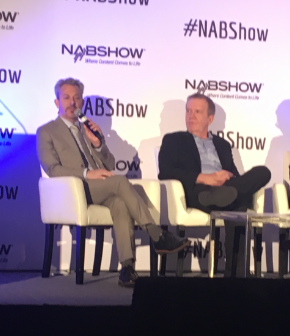
Those are the words of Jeff Greenfield, the COO and co-founder of C3 metrics, an attribution platform that measures the impact of media and demonstrates that impact to advertisers. Greenfield was on a panel hosted by Beasley Media Group’s Buzz Knight, Tuesday, at the NAB Show. Radio Ink caught up with Greenfield after the panel to ask him about his radio comments.
Radio Ink: You were pretty harsh on radio and said they do not prove anything?
Jeff: Yes. Historically radio has not proven anything at all. All they have said is, hey we can get the word out for you, and that’s it. For years that was enough until digital came along and was able to show these cool click trails and impression trails. Radio does not have that, so why should I buy radio?
Radio Ink: What would you say to iHeart, Westwood One, and other radio companies who, through recent studies, have shown radio provides up to a 16:1 ROI in some cases.
Jeff: Those ROI studies are 100% true. Radio does have that level of ROI. I would say in some cases even greater than that. The problem is if I’m an advertiser and I see a study that’s in my category, I do not want that. I want to have a dashboard where I can see the real-time impact. Do not show me a study, show me something that shows real-time.
Radio Ink: How does radio do that?
Jeff: The technology is there today. We’re in the middle of doing that with Westwood. We have been doing it since the beginning of the year with a number of their advertisers. Those studies you talk about come from us.
Radio Ink: Tell us how it works?
Jeff: From a high level, when people advertise on radio what they see is radio drives people to the digital realm. Digital is one of the best ways for you to have a 1:1 relationship with your consumer. You want to use that audio message to get them to go to that digital site. Our technology has created a metric called BOSS, which is a combination of that traffic. You can see a lift in search traffic and see that BOSS lift has a direct correlation to radio spots. We can look at not only the actual radio spots themselves but we can look at dayparts, days of the week, and the creative. That enables that true partnership we talked about where the account person can help the advertiser to manipulate the combination of buys and different creatives to get the huge impact we’re talking about
Radio Ink: How is that going to be deployed at a radio station?
Jeff: Instead of trying to give advertisers a different dashboard to look at, since they already have their eyes in Google Analytics, we’re going to leverage those eyeballs. All a radio station has to do is hookup and have the advertiser click a button. We get access to their Goggle data and we utilize that to push back that data in the dashboard that provides the message they need.
Radio Ink: During the panel discussion you also acknowledged that Proctor and Gamble came back to radio?
Jeff: Yes they did. They found that digital was not as effective as it once was and the only way to keep their message out there about their products during daytime is radio. Radio is a perfect mechanism to do that.
Radio Ink: You also mentioned the smaller markets not being sophisticated.
Jeff: The buyers in those markets. They are not in the same realm as a buyer from a large agency. Some of them are spending more than enough money to hire an agency but they don’t. It’s all typically in-house. They do not understand the nuances of what goes on in terms of looking at brand studies and brand-lift studies. They live in that world of Google Analytics and they believe everything Google tells them through that tool.
Radio Ink: Why do you say radio has been slow to adapt to the data?
Jeff: They have been slow to adapt because they have been fat and happy too long. What happened with radio was there was a slow move off radio to digital and radio kind of ignored it. They kind of supplemented it a little bit by selling Google and Facebook themselves. Then it fell off a cliff. Now all of a sudden it’s freakout time
Radio Ink: How can radio provide better analytics to advertisers?
Jeff: Invest money in it and do not be afraid of the results. If it turns out for a particular advertiser or group of advertisers that the type of stuff you’ve been selling them in the past is not working, then it’s time to get innovative and create products that are. Data is going to help you become a true partner to the advertiser, but as a station and a group you have to invest in order to do that. Otherwise you are not going to be around in a couple decades.





